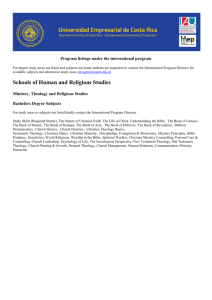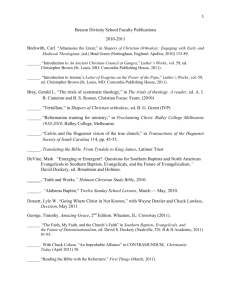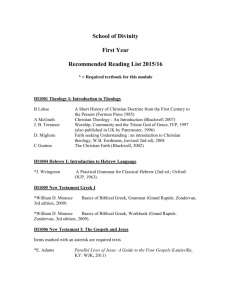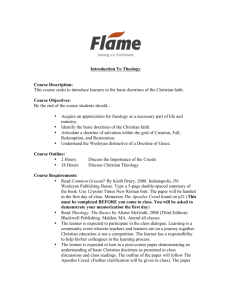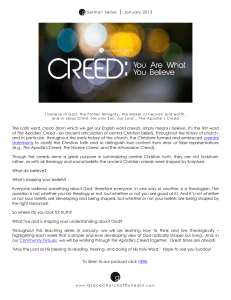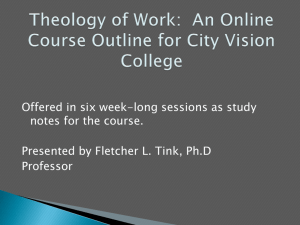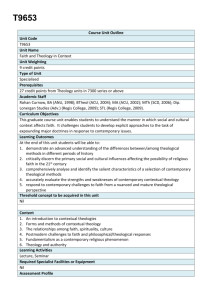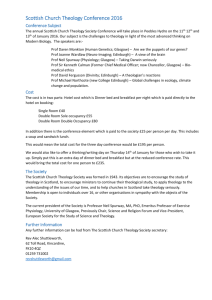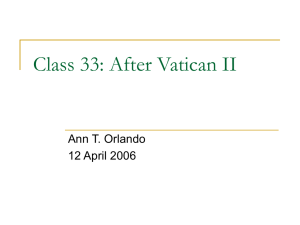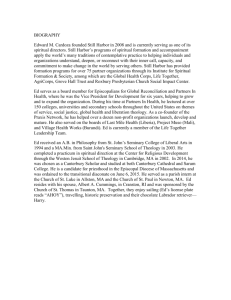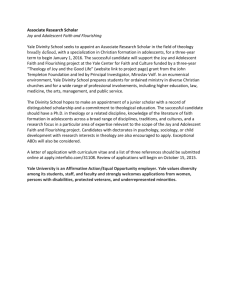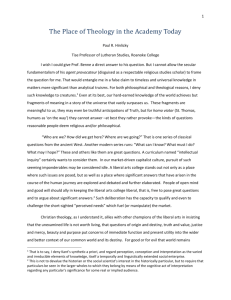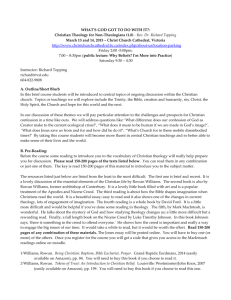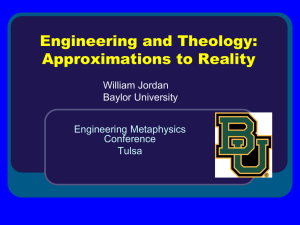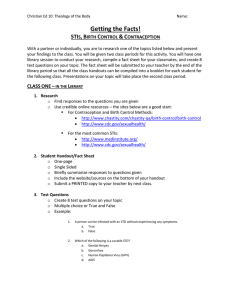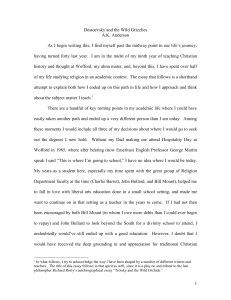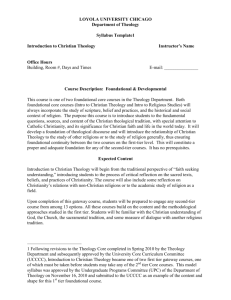Lesson 62 - Protestant Theology in the 19th Century
advertisement
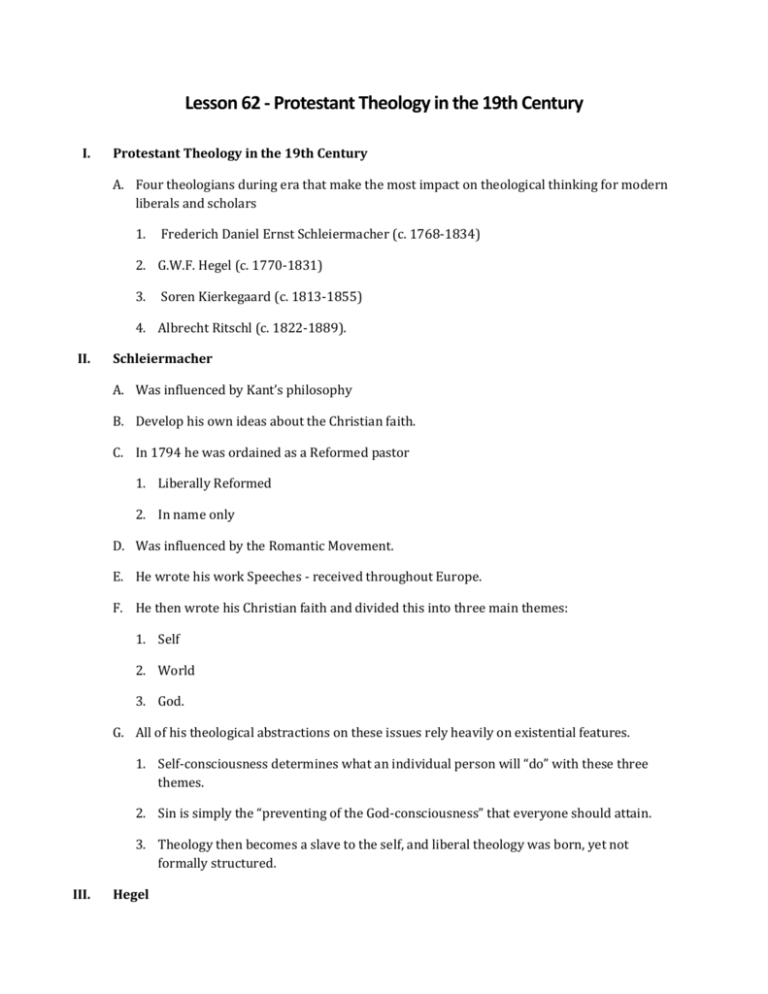
Lesson 62 - Protestant Theology in the 19th Century I. Protestant Theology in the 19th Century A. Four theologians during era that make the most impact on theological thinking for modern liberals and scholars 1. Frederich Daniel Ernst Schleiermacher (c. 1768-1834) 2. G.W.F. Hegel (c. 1770-1831) 3. Soren Kierkegaard (c. 1813-1855) 4. Albrecht Ritschl (c. 1822-1889). II. Schleiermacher A. Was influenced by Kant’s philosophy B. Develop his own ideas about the Christian faith. C. In 1794 he was ordained as a Reformed pastor 1. Liberally Reformed 2. In name only D. Was influenced by the Romantic Movement. E. He wrote his work Speeches - received throughout Europe. F. He then wrote his Christian faith and divided this into three main themes: 1. Self 2. World 3. God. G. All of his theological abstractions on these issues rely heavily on existential features. 1. Self-consciousness determines what an individual person will “do” with these three themes. 2. Sin is simply the “preventing of the God-consciousness” that everyone should attain. 3. Theology then becomes a slave to the self, and liberal theology was born, yet not formally structured. III. Hegel A. Considered himself a theologian. B. Was not a theology of traditional theism, but a sweeping attempt to understand ultimate reality in terms of a dialectic of contradictions and empowerment. C. Taught that the thesis of something and the antithesis of something did not wind up in a contradiction. 1. Rather it turned into a synthesis that rests upon a greater level than the supposed contradiction 2. It spring boarded the thinker toward the Absolute Religion. D. Hegel influenced: 1. Charles Darwin (1809-1882) 2. Karl Marx (1818-1883). IV. Kierkegaard A. Thought of himself as a man who was destined to make Christianity difficult. B. He is hailed as a great philosopher and the founder of modern existentialism. C. He divided the “Christian life” into three stages 1. The aesthetic- The aesthetic life is the man who is down in the dumps and cares nothing for life. 2. The ethical - The ethical man attempts at reforming his life with law and discipline. 3. The faithful. - Man of faith attempts to make a leap of faith a. Not intellect b. To trust in what his destiny may dictate to him as a Christian walk with God D. This last religious stage can only be reached by a conscious understanding of sin and leap towards God’s mercy for the person, although there are no guarantees that God would be merciful. V. Ritschl A. Main tenor of theology is seen in his three large volumes on The Christian Doctrine of Justification & Reconciliation. B. Forgiveness of sins means that the penalty of separation from God has been removed. C. God does not need to be reconciled, but men do. Lesson 62 - Protestant Theology in the 19th Century Page 2 of 3 1. Reconciliation implies more than justification. 2. Justification and reconciliation are a corporate matter. D. The Kingdom of God is not something that will come later, but has already come. 1. Recognizing one’s reconciliation in that kingdom amounts to upholding the vocation that God has given each man for the good of the others. 2. He emphasizes the love of God to all men, and rejects justice and divine wrath. 3. Sin and grace are reduced in their importance to mere bywords. E. Historical consideration took place at this time following Ritschl’s thoughts that the best way to enter into studying about Christianity is through history. F. Largest advocates of this tendency 1. Albert Schweitzer- wrote the Quest for the Historical Jesus 2. Ernest Troeltsch -wrote The social Teachings of Christian Churches. 3. Social Gospel under Walter Rauschenbaush G. The fundamentalists also emerged around the turn of the century (1895) upholding some the basic tenets of historical orthodoxy against the liberalism of the day. Lesson 62 - Protestant Theology in the 19th Century Page 3 of 3
